Audit: Old Wailuku Post Office Demolished After a Series of Missteps
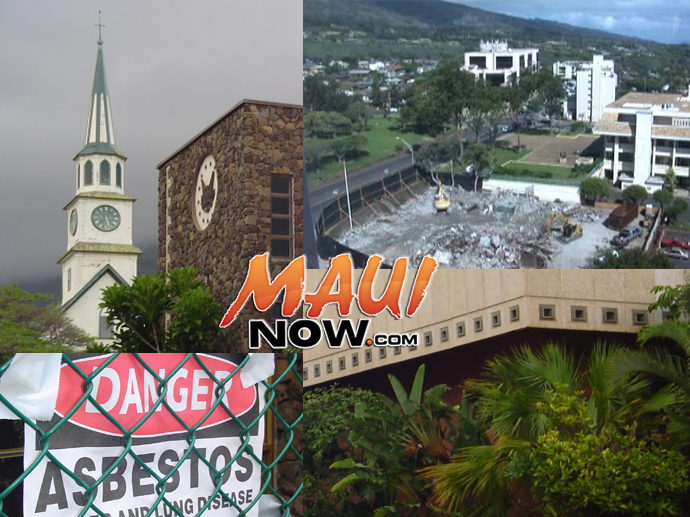
Old Wailuku Post Office. Photos by Wendy Osher.
A 47-page audit was released today by the Maui Office of the County Auditor on the demolition of the Old Wailuku Post Office.
The document, prepared by Lance T. Taguchi, CPA County Auditor, states that, “poor communication of what the project entailed,” led to the approval of what essentially was a $1.5 million placeholder.
Auditors say that placeholder, “coupled with assumptions and pressure to move quickly,” allowed for the demolition of the historic facility.
“While it is the County’s prerogative to do so, making such a contradictory decision in the dark ‐‐ without meaningful public participation — is bad government,” the audit stated.
The decision to demolish the facility instead of reusing it as originally proposed, occurred somewhere within a two-year period.
Audit work revealed a “loophole” in the County’s Budget Ordinance which the department says, “severely diminished the accountability and transparency of taxpayer funds.” In an effort to close that loophole, the Auditor communicated guidance to the Maui County Council’s Budget and Finance Committee on April 7, 2016.
According to the document, while the demolition itself was performed only after obtaining clearance certificates for asbestos, mold, and lead paint, “the County failed to conduct an Environmental Assessment or properly claim an Administrative Exemption Declaration.”
Further, it states that the Auditor questioned how the demolition of a historic building complies with the County’s Countywide Policy Plan which calls for the “preservation, restoration, and adaptive reuse of historic buildings and structures.”
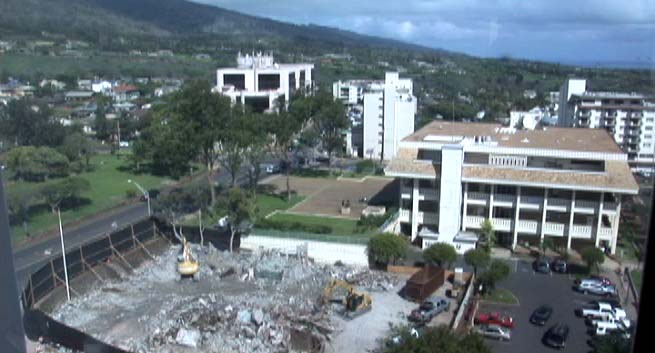
Old Wailuku Post Office demolition (foreground). File photo by Wendy Osher.
“Most importantly,” as the audit of the facility progressed, the auditor states that, “one pattern became quite clear: The County always chose the path that resulted in the least amount of public involvement.”
It states that in at all three major junctions relating to the demolition of the Old Wailuku Post Office, the public’s voice was not heard including the following:
ARTICLE CONTINUES BELOW AD• Funding – by rationalizing that “rehabilitation” included demolition, the County missed an opportunity to receive public testimony required through the Budget amendment process.
• Environmental Assessment – by choosing an Administrative Exemption Declaration, the County bypassed having to seek input from the public.
• Historic Preservation – by obtaining a clearance from the State Historic Preservation Division, the County ignored the public’s guidance in the Countywide Policy Plan.
The document states that, “The County’s pattern of actions is unfortunate because the public is left under-informed and in the dark.” It further stated that, “If this pattern continues, the County will be rushing to destinations that the public does not want to go.”
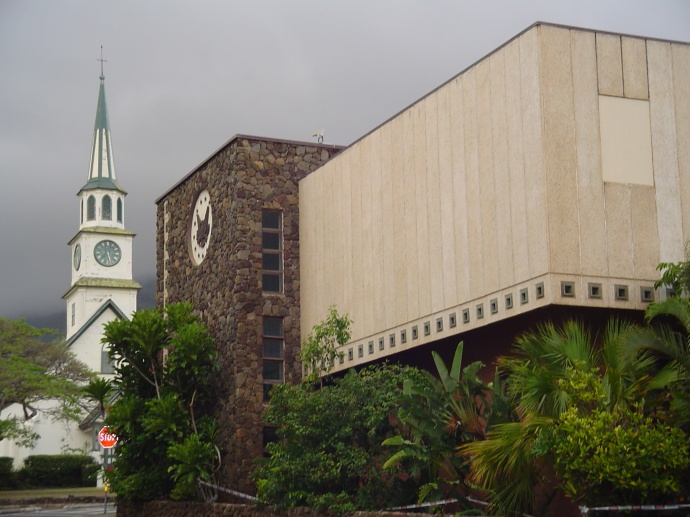
Old Wailuku Post Office, file photo by Wendy Osher.
Background:
The investigation and subsequent audit stems from a decision to demolish the Old Wailuku Post Office, instead of Rehabilitate it.
On Feb. 1, 2013, the Maui County Council’s Budget and Finance Committee was reportedly informed that dollars earmarked for the “Old Wailuku Post Office Rehabilitation project” were used to demolish the building and prepare a campus study of County facilities.
According to the audit, the County Council and the Mayor became “embroiled in a heated dispute over whether the demolition of the Old Wailuku Post Office was appropriate or legal. Some argued the demolition was a violation of the Budget Ordinance, while others said sometimes rehabilitation requires demolition.”
In the months that followed, the auditor’s report states that actions of the Mayor and his Administration, as well as Councilmembers “created a firestorm that drove a wedge between the two.”
The auditors report states that while “it was unclear who was right and who was wrong, for the public one question became crystal clear: How could both sides be so far apart on the issue?”
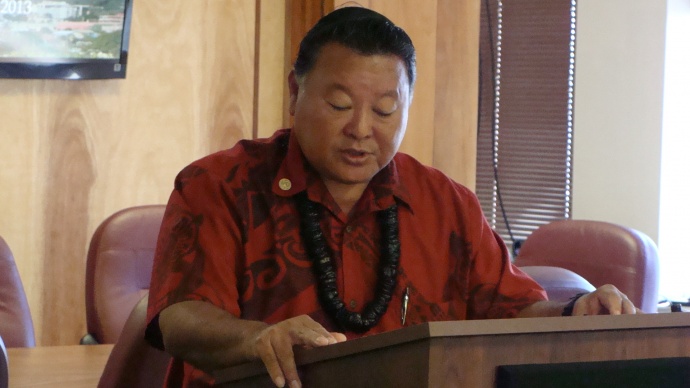
Maui Mayor Alan Arakawa issues a statement during a morning press conference on June 28, 2013, apologizing for a mistake involving miscommunication with the Old Wailuku Post Office demolition project. Photo by Wendy Osher.
What Went Wrong:
The Auditor reviewed the Mayor’s Fiscal Year 2012 Budget Proposal in an effort to understand what the Old Wailuku Post Office Rehabilitation initially entailed.
Specifically the Description and Justification of the project was found in the Capital Program and stated:
“Rehabilitation of Old Wailuku Post Office acquired by the County of Maui in 2009 to allow for occupancy for offices, meeting rooms and storage. Improvements anticipated include rehabilitation of roof to prevent water intrusion and to extend life span, upgrade 50-year old electrical, removal of asbestos on the first and second floors, removal of lead where necessary throughout building, removal of mold in the basement, fire sprinkler improvements, exterior concrete repairs, and necessary structural repairs.”
The cost of the rehabilitation was estimated at $1.5 million for design of the specific improvements and repairs of the building in FY 2012 and $4.25 million for construction of those improvements in FY 2013.
The Inspection Summary described the condition of the building and presented four options that included: (1) leave as is; (2) fix but use as warehouse; (3) fix and use as warehouse and offices; and (4) demolish and rebuild.
Auditor’s Perspective:
According to the auditor’s report, “When the FY 2012 Budget Ordinance was approved by the Council and certified by the Mayor, both the Council and the Mayor did not have a clear understanding of what the money was to be used for.”
The auditor found that there were only two documents relating to the Old Wailuku Post Office that were officially entered into public record prior to the passage of the FY 2012 Budget Ordinance: the Description and Justification and the Inspection Summary.
“When those two documents are reviewed together with the brief and disjointed Budget session discussions, a reasonable person would conclude that ‘rehabilitation’ of the Old Wailuku Post Office would involve re-use of the existing building, not demolition of the entire building,” the auditors report stated.
It further concludes that “When monies were appropriated in the FY 2012 Budget Ordnance, “rehabilitation” did not mean demolition of the entire Old Wailuku Post Office.”
Was the FY2012 Budget Ordinance Violated?
When trying to determine if there were any violations involving the FY2012 Budget Ordinance, the auditor issued “no opinion,” saying, “That determination can only be made through litigation, not the issuance of an audit report.”
“While it is the Auditor’s opinion that a reasonable person would conclude that rehabilitation of the OWPO would involve re-use of the existing building and not the demolition of the entire building, the Auditor relies on guidance issued by the Comptroller General of the United States.”
According to the Government Auditing Standard 7.21: “…Whether a particular act is, in fact, fraud or noncompliance with provisions of laws, regulations, contracts or grant agreements may have to await final determination by a court of law or other adjudicative body.”

Old Wailuku Post Office, file photo by Wendy Osher.
Lessons Learned:
In assessing the actions taken, the auditor’s report states, “Million dollar ‘placeholders’ do not belong in Budget Ordinances. While convenient, placeholders cause confusion for the Mayor and his Administration, the Council, and the public. If the Mayor is unsure of what his proposed project entails, then he should not include it in his Budget Proposal.”
Likewise, the report states, “If the Council is unsure of a project presented in the Mayor’s Budget Proposal, they should not include it in the Budget Ordinance. Instead, Councilmembers should ask the Mayor to propose a Budget amendment when the project is better defined.”
The auditor’s report further looks into the perspectives of the mayor, his administration, and the county council. It also reviewed several other concerns raised by the public.
In a concluding statement, the report states: “In the Auditor’s opinion, an Environmental Assessment should have been conducted to comprehensively examine potential impacts of the Old Wailuku Post Office demolition and the construction of a six-story building in Wailuku town.”
By not complying with the Hawaiʻi Environmental Policy Act, the document states, the “public was denied an opportunity to participate in the planning and decision-making process. The County should lead by example and abide by the laws that it expects private citizens and developers to comply with.”
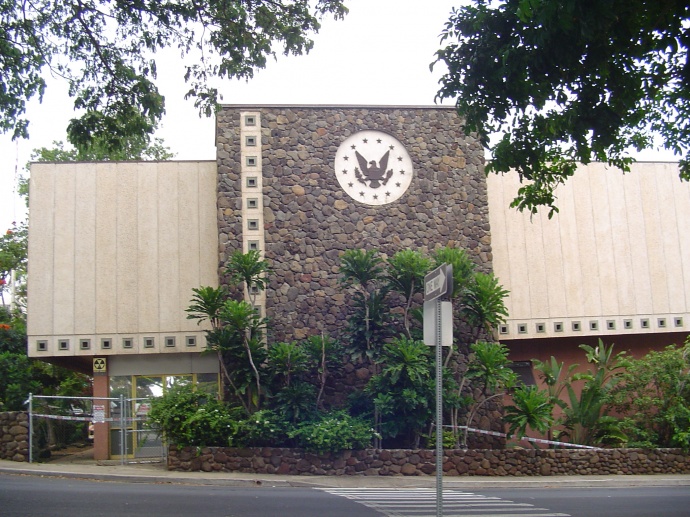
Old Wailuku Post Office, file photo by Wendy Osher.
History of the Old Wailuku Post Office:
The audit states that according to the Historic American Building Survey for the Wailuku Post Office/Federal Building, prepared by the County’s Department of Planning, the Old Wailuku Post Office “…was the first major Federal construction project in Maui County after World War II and provided a prominent government presence in the outer islands after statehood.”
It was also “…unique in its design and served dual functions ‐‐ providing a main post office on the first floor as well as offices for Federal agencies on the second.” It also received a citation of merit for ‘Civil Beautification’ in 1961.
During its use, the basement reportedly served as a civil defense shelter for Wailuku town.
The facility was closed in 1990 when the US Postal Service relocated to its current site at the Wailuku Mill Yard.










